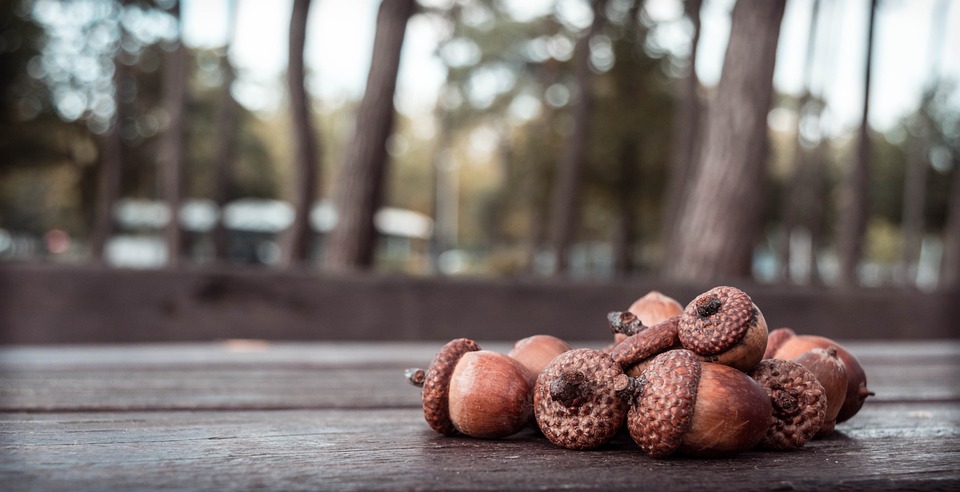Acorns shown to have neuroprotective properties
02/09/2019 / By Ellaine Castillo

One of the biggest problems that the elderly population face is Alzheimer’s disease, which is the leading cause of dementia. The Centers for Disease Control and Prevention (CDC) estimates that more than 5 million Americans suffer from this disease and by 2060, this statistic is projected to reach as much as 14 million. Over time, Alzheimer’s becomes more debilitating, with its symptoms ranging from difficulty in remembering new information to severe memory loss, changes in behavior, and problems with speaking, swallowing, and walking.
What makes Alzheimer’s even more worrisome is that commercially available medications for this neurodegenerative disease still have limited effectiveness. Moreover, these drugs have been associated with side effects like headaches, sleep disorders, digestive problems, bleeding, and slow heart rate. Because of this, scientists continue to search for potential remedies like compounds derived from natural products.
Previous studies by researchers from Gazi University and Kilis 7 Aral?k University in Turkey have shown that herbal coffees, such as those from carob, black cumin, dates, and tumble thistle, contain compounds with neuroprotective properties. These protective effects stem from their ability to inhibit cholinesterase and tyrosinase, which are enzymes involved in neurodegeneration. These promising findings led the same team of researchers to consider other ingredients used for herbal coffees. From their search, they found that acorn from the kermes oak (Quercus coccifera) is another potential source of natural cholinesterase inhibitors.
The kermes oak is an evergreen plant species that is widely distributed across the Mediterranean region. Traditionally, the different parts of this plant were used as natural remedies for hemorrhoids, diabetes, diarrhea, kidney stones, high blood pressure, and wounds. These pharmacological benefits of the kermes oak can be attributed to the presence of tocopherols, fatty acids, and phenolic compounds like tannins and flavonoids. However, there is a possibility that processing can affect the phytochemical content of the plant.
In this study from the Turkish Journal Of Agriculture And Forestry, the researchers collected extracts from raw peeled acorns as well as two acorn coffee samples, which were made using the following methods: 1) boiled, roasted, and then ground and 2) roasted and then ground. They then proceeded to test them for in vitro cholinesterase and tyrosinase inhibitory activity, as well as antioxidant activity and the total phenol and flavonoid contents.
The results of the study revealed that the extracts were able to inhibit cholinesterase activity but not tyrosinase activity. Furthermore, the observed activity of the samples showed that extracts from the raw material were more active than the coffee samples. This could mean that processing does affect the concentration of compounds responsible for cholinesterase inhibitory activity. Data from the phytochemical analysis of the samples showed that the raw material did have the highest total phenol content, while the coffee samples that were produced from boiling, roasting, and grinding had the lowest. Moreover, extracts from the raw material exhibited the highest antioxidant activity. This is important to note since some studies have also associated antioxidants with protective activity against Alzheimer’s.
Overall, the results of this study show that acorns have neuroprotective properties that can be attributed to its cholinesterase inhibitory activity. With further studies, these can be developed into safer alternatives for harmful Alzheimer’s medications. (Related: Treatment for Alzheimer’s can kill faster than the disease: Antipsychotic drugs found to increase risk of death.)
Natural ways to prevent Alzheimer’s
Protecting yourself from Alzheimer’s and other neurodegenerative diseases can be as simple as introducing healthy changes to your lifestyle. Some ways through which you can reduce Alzheimer’s risk include the following:
- Following the Mediterranean diet — Studies have shown that people who follow the Mediterranean diet have a lower risk of developing cognitive impairment and Alzheimer’s’. This is because the diet is rich in highly nutritious foods like vegetables, beans, whole grains, fish, and olive. Moreover, it limits the number of processed foods that are rich in sugar and preservatives.
- Exercising regularly — Regular exercise has been associated with as much as 50 percent reduction in Alzheimer’s risk. This is possible since exercise stimulates the brain and enhances its ability to repair damaged connections and to make new ones. To achieve optimal results, people should get at least 150 minutes of cardio and strength training exercises per week.
For more news articles on how you can protect your brain from damage, visit Brain.news
Sources include:
Submit a correction >>
Tagged Under:
This article may contain statements that reflect the opinion of the author
RECENT NEWS & ARTICLES
COPYRIGHT © 2017 SUPER FOODS NEWS





















